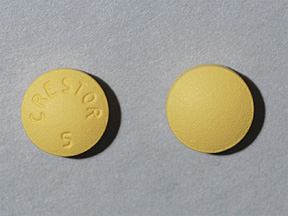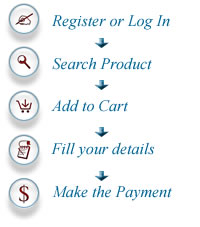|


|
|
| |
 | |
Generic Crestor 5mg
| | 24 pills - 42.22 EURO (1.76 EURO/pill) | Add to cart | | 48 pills - 82.78 EURO (1.72 EURO/pill) | Add to cart | | 72 pills - 116.67 EURO (1.62 EURO/pill) | Add to cart |
Crestor (Rosuvastatin) is an HMG-CoA reductase inhibitor used with a proper diet to help lower cholesterol and fat (triglyceride) levels and to raise good cholesterol (HDL) levels in your blood.
Synonyms: Razel, Rostar, Rosuvas
For large orders the Registered Mail shipping fee will be applied for each 100 pills.
For order more then 300 pills or bulk orders, please, contact [email protected] in order to have a special price.
Shipped from: EU
Out of stock |
|
What is the most important information I should know about Crestor?
- Rare cases of muscle problems and liver problems have been associated with the use of Crestor and other similar medicines. Contact your doctor immediately if you experience unexplained muscle pain, tenderness, or weakness, especially if accompanied by a fever or flulike symptoms or yellowing of the skin or eyes, abdominal pain, unexplained fatigue, dark colored urine or pale colored stools. These may be early symptoms of muscle or liver problems.
- Crestor is in the FDA pregnancy category X. This means that Crestor is known to cause birth defects in an unborn baby when taken during pregnancy. Do not take Crestor if you are pregnant or could become pregnant during treatment.
- Do not take Crestor without first talking to your doctor if you have liver disease.
- Crestor and other similar medicines can cause muscle injury, which in rare, severe cases, can cause kidney damage and organ failure that are potentially life-threatening.
- Alcohol and Crestor can both be damaging to the liver. Discuss with your doctor the amount of alcohol that you drink so that it can be determined if Crestor is the best choice for lowering your cholesterol.
What is Crestor?
- Crestor is an HMG CoA reductase inhibitor. Crestor blocks the production of cholesterol (a type of fat) in the body.
- Crestor is used to reduce the amounts of LDL (bad) cholesterol, total cholesterol, triglycerides (another type of fat), and apolipoprotein B (a protein needed to make cholesterol) in the blood. Crestor also increases the level of HDL (good) cholesterol in the blood. These actions are important in reducing the risk of atherosclerosis (fatty deposits in the arteries), which can lead to heart attack, stroke, and peripheral vascular disease.
- Crestor may also be used for purposes other than those listed in this medication guide.
What should I discuss with my healthcare provider before taking Crestor?
- Do not take Crestor without first talking to your doctor if you have liver disease.
- Before taking Crestor, tell your doctor if you
- have kidney problems;
- have hypothyroidism (low thyroid function);
- drink alcoholic beverages;
- have a chronic muscular disease;
- require major surgery; or
- have a blood disorder.
- You may not be able to take Crestor, or you may require a dosage adjustment or special monitoring during treatment if you have any of the conditions listed above.
- Crestor and other similar medicines can cause muscle injury, which in rare, severe cases, can cause kidney damage and organ failure that are potentially life-threatening.
- Crestor is in the FDA pregnancy category X. This means that Crestor is known to cause birth defects in an unborn baby when taken during pregnancy. Do not take Crestor if you are pregnant or could become pregnant during treatment.
- It is not known whether Crestor passes into breast milk and if it will be harmful to a nursing baby. Do not take this medication without first talking to your doctor if you are breast-feeding a baby.
How should I take Crestor?
- Take Crestor exactly as directed by your doctor. If you do not understand these directions, ask your pharmacist, nurse, or doctor to explain them to you.
- Take each dose with a full glass of water.
- Crestor can be taken with or without food.
- Crestor is usually taken once a day. Try to take each dose at the same time daily. Follow your doctor's instructions.
- It is important to take Crestor regularly to get the most benefit. Do not stop taking Crestor without first talking to your doctor. It may be weeks or months before beneficial effects are seen from this medication.
- Your doctor may want to monitor your liver function with blood tests before starting treatment with Crestor, at twelve weeks after start of treatment and after any increase in dose, and periodically (every 6 months) thereafter. Depending on the results of these tests, your doctor can determine how much monitoring you will require.
- Eat a low-fat, low-cholesterol diet. To realize beneficial effects from Crestor, avoid fatty, high-cholesterol foods.
- Store Crestor at room temperature away from moisture and heat.
What happens if I miss a dose?
- Take the missed dose as soon as you remember. However, if it is almost time for the next dose, skip the missed dose and take only the next regularly scheduled dose. Do not take a double dose of this medication.
What happens if I overdose?
- Seek emergency medical attention if an overdose is suspected.
- The symptoms of a Crestor overdose are not known.
What should I avoid while taking Crestor?
- Alcohol and Crestor can both be damaging to the liver. Discuss with your doctor the amount of alcohol that you drink so that it can be determined if Crestor is the best choice for lowering your cholesterol.
- Do not take Crestor with antacids that contain aluminum and magnesium such as Maalox, Mylanta, Gelusil and others. If an antacid that contains aluminum and magnesium is needed, it should be taken at least 2 hours following a dose of Crestor.
What are the possible side effects of Crestor?
- Rare cases of muscle problems and liver problems have been associated with the use of Crestor and other similar medicines. Contact your doctor immediately if you experience unexplained muscle pain, tenderness, or weakness, especially if accompanied by a fever or flulike symptoms or yellowing of the skin or eyes, abdominal pain, unexplained fatigue, dark colored urine or pale colored stools. These may be early symptoms of muscle or liver problems.
- If you experience a rare but serious allergic reaction (difficulty breathing; closing of the throat; swelling of the lips, tongue, or face; or hives) stop taking Crestor and seek emergency medical attention or contact your doctor immediately.
- Other, less serious side effects may be more likely to occur. Continue to take Crestor and talk to your doctor if you experience
- headache;
- diarrhea or constipation; or
- nausea or upset stomach.
- Side effects other than those listed here may also occur. Talk to your doctor about any side effect that seems unusual or that is especially bothersome.
What other drugs will affect Crestor?
- Do not take Crestor with antacids that contain aluminum and magnesium such as Maalox, Mylanta, Gelusil and others. If an antacid that contains aluminum and magnesium is needed, it should be taken at least 2 hours following a dose of Crestor.
- Before taking Crestor, talk to your doctor if you are taking any of the following medicines:
- cyclosporine (Sandimmune, Neoral);
- clofibrate (Atromid-S);
- fenofibrate (Tricor);
- gemfibrozil (Lopid);
- niacin (Nicolar, Nicobid, Nicotinex, others); or
- warfarin (Coumadin).
- You may require a dosage adjustment or special monitoring during treatment if you are taking any of the medicines listed above.
- Drugs other than those listed here may also interact with Crestor. Talk to your doctor and pharmacist before taking any prescription or over-the-counter medicines, including vitamins, minerals, and herbal products. |
|
|
Privacy Policy |
Terms & Conditions |
Sitemap
Copyright © 2024 viagra-cialis-pharmacy.com
Any trademark names used on this site including Viagra®, Cialis®, and Levitra® and other trademarks are the property of each trademark holder. Information on this online pharmacy site is provided for informational purposes only and is not a substitute for professional medical advice. You should not use the information on this online pharmacy site for diagnosing or treating a medical or health condition. You should carefully read all product packaging. If you have or suspect you have a medical problem, promptly contact your professional healthcare provider.
Certified Pharmacy Supplier



|




















